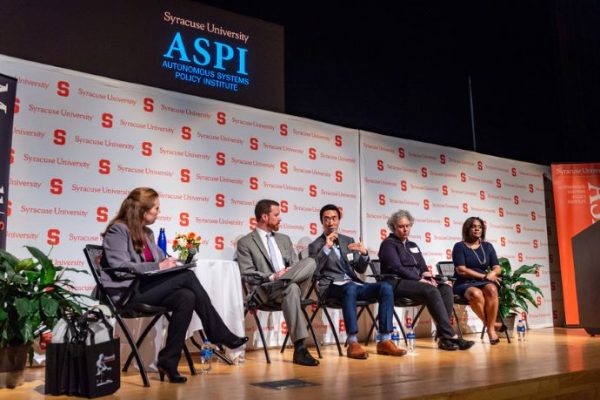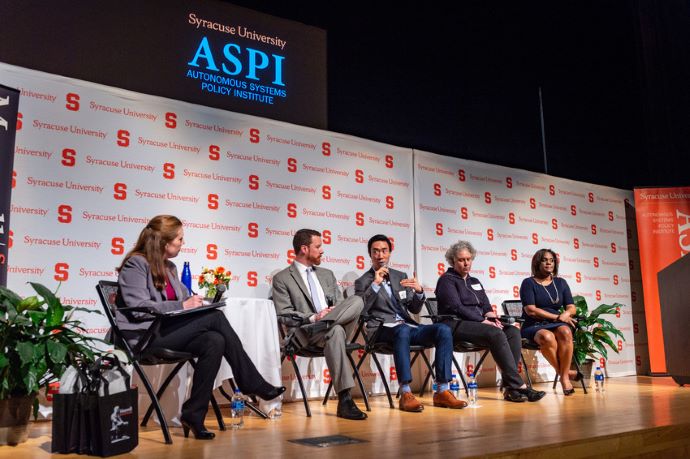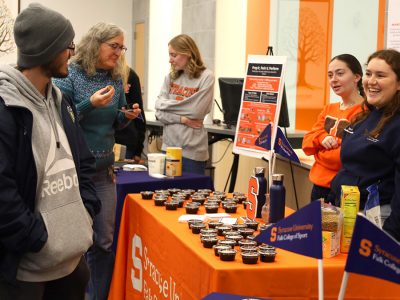Maxwell Faculty Expert on Autonomous Systems Policy Presents at White House Summit on Advanced Air Mobility
Jamie Winders, professor of geography and the environment in the Maxwell School of Citizenship and Public Affairs, was among the presenters offering perspectives on advanced air mobility technologies at a White House summit in Washington, D.C., last week.
Winders, associate provost for faculty affairs and founding director and now senior research associate of the University’s Autonomous Systems Policy Institute, participated on the panel, “Promoting American Global Leadership and Competitiveness into the 21st-Century.” The discussion was part of an all-day examination of a variety of issues surrounding advanced air mobility hosted by the White House Office of Science and Technology Policy. Winders was asked to speak as an expert in the field of autonomous systems policy.

Alondra Nelson, deputy assistant to the president in the White House Office of Science and Technology Policy, introduced the session saying the country has an imperative “to be intentional about developing new systems as well as building strategies for responsible and equitable use of advanced air mobility technology. “It’s within our power, therefore within our responsibility to give this shape and structure to create a national strategy to keep aviation innovation within the United States,” she said.
The term advanced air mobility refers to new aircraft vehicles that rely on automated or autonomous technologies and have the potential to provide air transportation for both people and cargo. Advanced air mobility includes a spectrum of vehicle types, including “air-taxi” concepts such as piloted and unpiloted electric vertical take-off and landing vehicles, conventional piloted take-off and landing vehicles and small unmanned aircraft systems (drones).
The University’s Autonomous Systems Policy Institute is an interdisciplinary effort to advance knowledge and teaching in the field of autonomous systems. It explores frontiers in the technology, governance and societal impacts associated with autonomous systems. The institute takes a broad perspective in assessing how autonomous systems impact the world and what kinds of design, policies and practices can best shape their ethical and fair use.

Important Audience
Winders says the conference provided the opportunity for a valuable mix of manufacturing, government, technology and academic interests to collectively scope out ways the United States can elevate its leadership in advanced air mobility systems.
Her panel addressed the ins and outs of the industry supply chain and what it would mean for the United States to have leadership in the manufacture of advanced air mobility systems. Since currently 70 percent of drones in use in the United States are manufactured in China, Winders notes, “we have not done the heavy lift of providing industry support or making the same investments in manufacturing and infrastructure that China has.”
For the U.S. to become an industry leader, beyond focusing on designing and building flying vehicles, the government and manufacturers will need to think about forming policies and regulatory frameworks for their use and examining the impacts of the technology on society, Winders says. “When we think about what it takes to remain competitive, we need to manufacture at home, but we also need to think about where these vehicles might fly, whose communities are served, who’s asked to innovate and who isn’t at that table.”
Playing a ‘Long Game’
Another imperative is providing appropriate education and skills training that will equip people to work in the emerging industry, Winders says. “We need to start now investing in the next generation. It has to start early, when kids are little, and it should be available to all children—those from wealthy schools and those from schools that are underfunded. All children should be introduced to the technology to make sure the good jobs that come out of these developments are equitably available to all workers.”
Producing the next generation of advanced air mobility thought leaders will require creating more partnerships and “playing the long game,” investing now to yield results longer-term, Winders says. “If you think of a cradle-to-career model, you need to pique the interest of young kids and determine how to future-proof the skills you’re providing them. We need to make sure the skills they learn are transferable and we should consider what investments we should make to attract the 7- and 8-year-olds to this industry. They are the students who will be going to college to study these topics.”
Critical Moment in Air Mobility
Following her presentation, Winders said she was “excited and honored” to be invited to the summit.
“The audience was important, and this is a critical moment in the emergence of advanced air mobility. As a faculty member, it’s a great feeling to be at the table when the agenda is being mapped out for how we as a country are going to embrace these new technologies.” she says.



